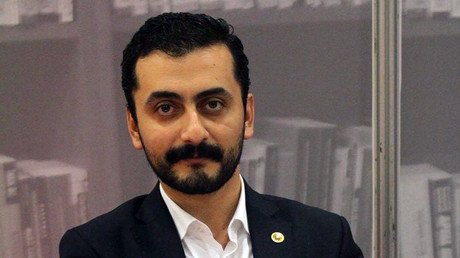Erdogan’s war on media: Sputnik Turkey chief banned from entering Istanbul, told to fly to Russia
Russian news agency Sputnik’s Turkish bureau chief has been blacklisted by Ankara, who refused him entry to the country in an airport, and seized his residence permit and press credentials.
“I landed in Istanbul at 0:40 today with Aeroflot’s flight 2134. The border control staff held me at the passport control for some 10 minutes, then ushered me to the passenger control premises without explaining anything,” Sputnik’s Turkish bureau Chief Tural Kerimov told RT from the waiting room for passengers attending inspection and screening at Istanbul’s Ataturk Airport.
Kerimov says he presented all of the documents he had: Russian passport, boarding pass, Turkish press card and Turkish residence permit he had been granted earlier. The Russian journalist specifically stressed that Turkish border guards and airport authorities acted in a polite and supportive manner. The border guards were not informed about the reason for the entry ban, Kerimov insisted.
After being held for about an hour, Kerimov was handed written notification that he is considered unwelcome in the Turkish Republic and his entrance to the country is barred. He was ordered to leave Turkey on the first available flight, but Kerimov insisted that it ought to be an Aeroflot flight. Turkish authorities agreed and he remained until 2:55 p.m. local time (11:55 GMT). Kerimov met with Russia’s consular representative and related the incident.
In an interview with RT, Kerimov said that Turkey has not issued any explanation for denying him entry, but he nevertheless remains hopeful that he will eventually receive one.
“A number of media representatives have been having certain problems in Turkey recently, both figures from the Turkish media and from international news outlets.
I can’t predict what the Turkish authorities plan to do further, but hopefully [we] will be given the reasons for what happened.
Over the past year there have been certain difficulties, on a variety of subjects. In particular, we [Sputnik news agency] had problems concerning the alternative coverage of the Syrian crisis as this is, as you are well aware, a pressure point for the region, as well as for Turkey. We’ve been having problems and I can’t say exactly when they will be solved.”
Turkish court backs blocking of Sputnik news agency websitehttps://t.co/A7dj0VasSXpic.twitter.com/CPTfITTAq5
— RT (@RT_com) April 16, 2016
Ankara has officially banned Sputnik’s Turkish bureau chief, Tural Kerimov, from entering the country “on the decision of security bodies,” Turkish deputy Prime Minister Numan Kurtulmus told journalists.
“This man is not in Turkey now,” Kurtulmus said, stressing that the decision “has nothing to do with” Turkey’s Press and Information Office.
Last week, Sputnik was shut down by Turkey without prior notification under “administrative measures” imposed by the country’s authorities.
Turkish repression targets Germany, Russia; EU panders to Erdogan’s autocratic regime (Op-Edge) https://t.co/HWe8BA7mtB
— RT (@RT_com) April 16, 2016
President Erdogan’s government has been clamping down on a number of Turkish media outlets that are critical of Ankara government’s policies. But this was the first time an international news agency has been silenced.
Turkey has been slammed for violating press freedoms. In January 2015, the Turkish prime minister and other members of the cabinet received the power to block any web resource without a court order.
READ MORE: Turkey blocks Facebook, Twitter following deadly Ankara blast – reports
Politicians can now demand that the Telecommunications Department block or delete contents from a website within four hours after receiving a notice of “national security, protection of social order, or for the prevention of crime.”
The media clampdown law, No. 5651, has been widely criticized in Turkey, with many arguing that it limits citizens’ access to information. Turkey has used this legislative cloak numerous times to temporarily block Twitter, Facebook and YouTube in the country after numerous leaks of alleged secret documents.
For example, access to YouTube was cut off in March 2014 after audiotapes that appeared to show ministers talking about provoking military intervention in Syria were leaked on the video site.
One of the most extreme examples of Turkish censorship was the raid on the opposition newspaper Today’s Zaman headquarters in March, which was described as “a totally barbaric act” by the newspaper’s former editor-in-chief, Bulent Kenes.
Turkey also began a treason investigation against a Turkish MP, Eren Erdem, of the Republican People’s Party (CHP), who alleged in an exclusive interview with RT that Islamic State jihadists delivered deadly sarin gas to Syria through Turkey.
READ MORE: German TV journalist refused entry to Turkey, detained in Istanbul airport
Foreign journalists have also been targeted and arrested. The latest incident involved TV journalist Volker Schwenck, reporting for German broadcaster ARD, who was going to the Turkish-Syrian border to report on refugees, but instead was denied entry into Turkey and spent six hours in detention at Istanbul airport.














